| Srl | Item |
| 1 |
ID:
131909
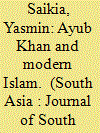

|
|
|
|
|
| Publication |
2014.
|
| Summary/Abstract |
Pakistan is viewed today as a haven for fundamentalist Islamists. This essay probes the genealogy of Pakistan's Islamisation by focusing on the rule of President Ayub Khan (1958-69) and extends to the war of 1971 and the dismembering of Pakistan during Yahya Khan's presidency. I trace Ayub Khan's project of 'modernising Islam and the nation' by probing three sites: the transformation of the Pakistani military into a jihadic army; the re-writing of history to craft an Islamic identity; and the reformation of East Pakistani Bengalis to make them 'good Muslim subjects'. Ayub Khan's experiment was a failure, leading to the violent dismembering of the country in 1971, yet an ethical imaginaire of renewing the commitment to creating a humanistic moral community continues to be an ongoing quest in Pakistan, as reflected in my investigations of the oral testimonies of war veterans. Fulfilling these ethical concerns requires critical evaluation of the roots of Islamisation in Pakistan, beginning from the period of Ayub Khan's presidency.
|
|
|
|
|
|
|
|
|
|
|
|
|
|
|
|
| 2 |
ID:
105691
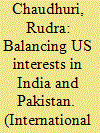

|
|
|
|
|
| Publication |
2011.
|
| Summary/Abstract |
Convincing the Pakistani military to focus its attention on the Afghan Taliban and associated groups has so far proved unsuccessful. The Obama administration's reliance on economic incentives and regional peace initiatives, such as a dialogue with India on Kashmir, has failed to deliver tangible results. Instead, India's footprint within Afghanistan has expanded, leaving Pakistani elites ever more anxious. Balancing Indian and Pakistani interests in South Asia remains a top priority for Western governments, and most importantly the US. In the current milieu this will require shifting Western bureaucratic focus from the age old and seemingly intractable Kashmir dispute to maintaining the peace within Afghanistan. This article outlines why this shift should be considered, and how the India--Pakistan trust deficit might be bridged.
|
|
|
|
|
|
|
|
|
|
|
|
|
|
|
|
| 3 |
ID:
083927


|
|
|
| 4 |
ID:
140926
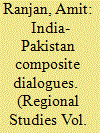

|
|
|
| 5 |
ID:
122927
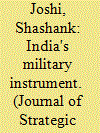

|
|
|
|
|
| Publication |
2013.
|
| Summary/Abstract |
For six years, India has sought to implement an army doctrine for limited war, 'Cold Start', intended to enable a Cold War era force optimised for massive offensives to operate under the nuclear threshold. This article asks whether that is presently feasible, and answers in the negative. Doctrinal change has floundered on five sets of obstacles, many of which are politically rooted and deep-seated, thereby leaving the Army unprepared to respond to challenges in the manner envisioned by the doctrine's architects.
|
|
|
|
|
|
|
|
|
|
|
|
|
|
|
|
| 6 |
ID:
112766
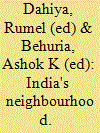

|
|
|
|
|
| Publication |
New Delhi, Institute for Defence Studies and Analyses, 2012.
|
| Description |
xxx, 226pHbk
|
| Standard Number |
9788182746879
|
|
|
|
|
|
|
|
|
|
|
|
Copies: C:2/I:0,R:0,Q:0
Circulation
| Accession# | Call# | Current Location | Status | Policy | Location |
| 056593 | 327.54/DAH 056593 | Main | On Shelf | General | |
| 056594 | 327.54/DAH 056594 | Main | On Shelf | General | |
|
|
|
|
| 7 |
ID:
124079
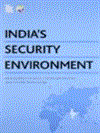

|
|
|
|
|
| Publication |
New Delhi, Konark publishers Pvt.Ltd., 2013.
|
| Description |
xxvi, 362p.Hbk
|
| Standard Number |
9789322008260
|
|
|
|
|
|
|
|
|
|
|
|
Copies: C:1/I:0,R:0,Q:0
Circulation
| Accession# | Call# | Current Location | Status | Policy | Location |
| 057472 | 355.033054/ROY 057472 | Main | On Shelf | General | |
|
|
|
|
| 8 |
ID:
119629


|
|
|
| 9 |
ID:
142337
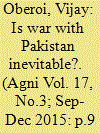

|
|
|
| 10 |
ID:
112673


|
|
|
|
|
| Publication |
New Delhi, Publications Division, Min. of Information and Broadcasting, Govt. of India, 1958.
|
| Description |
5vol.set; xii, 527p.Hbk
|
| Contents |
Vol.III: 1953-1957
|
| Standard Number |
8123004222
|
|
|
|
|
|
|
|
|
|
|
|
Copies: C:1/I:0,R:1,Q:0
Circulation
| Accession# | Call# | Current Location | Status | Policy | Location |
| 056552 | 954.042/IND 056552 | Main | On Shelf | Reference books | |
|
|
|
|
| 11 |
ID:
087116
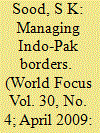

|
|
|
|
|
| Publication |
2009.
|
| Summary/Abstract |
The major proble of Indo-Pak border management is the myopic view and general perception that this is the resposibility of BSF alone and that border security is the be all and end all of that border management. This attitude is slowly changing, as reflected by the creation of a separate department of border managment can be improved withe the economic development of border areas and through the coordinated efforts of all stakehoders. The Government should harness the unique position of BSF as its sole visible instrument in remote far-flung areas to identify the problems of border populations and initiate programs and projects for their overall economic development. Fucussed development of the border area is essential to make adequate employment opprtunities and economic avenues available to border populations so that key do not fall prey to the designs of criminals and anti-national elements.
|
|
|
|
|
|
|
|
|
|
|
|
|
|
|
|
| 12 |
ID:
139068


|
|
|